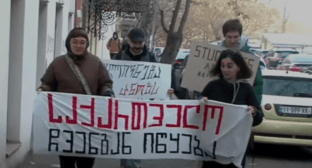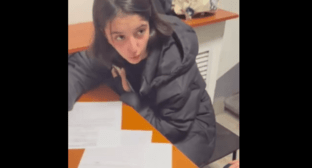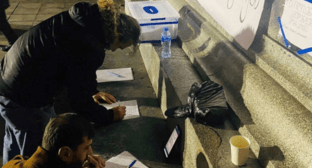08 March 2021, 15:19
Week in the Caucasus: review of main events of March 1-7, 2021
Mass protests by Pashinyan's opponents in Yerevan and announcement by the prime minister of the constitutional reform in Armenia; conviction of Circassian activist Martin Kochesoko; sixth replacement of the mayor in Grozny within 10 years; resumption of negotiations between Georgia and South Ossetia on the situation on the border, – see the review of these and other events in the Caucasus during the week of March 1-7, 2021, prepared by the "Caucasian Knot".
Mass protests by Pashinyan's opponents in Yerevan and announcement by prime minister of constitutional reform in Armenia
On February 25, in Armenia, supporters of the opposition launched a new wave of protests after the Prime Minister Nikol Pashinyan's call for the resignation of the General Headquarters of the Armenia's Armed Forces. The activists spent the past week in a tent camp in front of the parliament building. The protestors demand the resignation of Nikol Pashinyan himself. About 100 activists stay overnight at the tent camp, and they hold rallies in the daytime. The protesters promised to continue their action until the resignation of the government. On March 1, the authorities and the opposition held independent rallies in Yerevan. The pro-government rally gathered 20,000 people, and 8000 activists came to the opposition action. According to political analysts, the authorities used administrative resources when organizing a rally in Yerevan and will do the same in case of elections, but the opposition has enough supporters to effectively control the voting. The experts note that the authorities avoid suppressing the protests by force.
At a rally on March 1, Nikol Pashinyan announced the holding of a referendum in October on the transition from a parliamentary to a semi-presidential form of government in the country. The Armenian Prime Minister also reminded the opposition of the proposal to hold early parliamentary elections. He believes that the new form of government will guarantee stability in the country and exclude in the future "the formation of any internal political crises." Lawyers criticized the Nikol Pashinyan's plans to change the Constitution. The constitutional reform planned by the Prime Minister will only aggravate the political crisis and will not increase the efficiency of state administration, Vardan Aivazyan emphasizes. Nikol Pashinyan is not satisfied with the fact that the president is the guarantor of the Constitution, says constitutional law expert Goar Meloyan.
Conviction of Circassian activist Martin Kochesoko
On March 3, in Kabardino-Balkaria, a court sentenced Martin Kochesoko, the leader of the public organization "Khabze", a co-chairman of the Democratic Congress of the Peoples of Russia, to three years of probation in a drug case. The activist was detained on June 7, 2019. Immediately after his detention, he pleaded guilty to possession of drugs, but later retracted his testimony and claimed the pressure had been exerted on him. Martin Kochesoko insists that the drugs were planted to him. The activist pleads not guilty and intends to appeal against the verdict. During the pleadings in court, an advocate claimed that people dependent on law enforcers were invited as witnesses during the detention of Martin Kochesoko and that secret witnesses appeared to be unable to clarify the circumstances of the case in court. In his final speech, Martin Kochesoko himself denied accusations of illicit drug trafficking and called his public activities the reason for the criminal proceedings against him. The criminal proceedings against Martin Kochesoko are a demonstrative punishment, note human rights defender Valery Khatazhukov and journalist Maxim Shevchenko. Prosecutors requested the court to sentence Martin Kochesoko to probation, because the charge fell apart, the court was fulfilling a political order and judges were not brave enough to acquit the activist, the Human Rights Centre (HRC) "Memorial"* suggests.
Sixth replacement of mayor in Grozny within 10 years
On March 2, upon the recommendation of Ramzan Kadyrov, his relative Khas-Magomed Kadyrov was appointed the acting Mayor of Grozny. Isa Khadjimuradov, who held the above post since February 2020, was transferred to the position of the deputy chief of the administration of the leader and the government of Chechnya. The leader of Chechnya explained his recommendation to appoint Khas-Magomed Kadyrov as the Mayor of the Chechen capital by the investors' interest in the development of Grozny. Some Instagram users questioned the need for the resignation of Isa Khadjimuradov from the post of the Mayor of Grozny.
It should be noted that within the past 10 years, the mayor of Grozny has been changed for the sixth time already. In the period from 2007 to 2012, Muslim Khuchiev held the post of the mayor of the Chechen capital. In 2012-2015, Islam Kadyrov, who was married to a niece of the Ramzan Kadyrov's wife, held the post of the Grozny city administration and became the youngest city mayor in Russian history. Then, Muslim Khuchiev returned to the chair of the chief of the city administration, and in 2018, he was replaced by Kadyrov's nephew Ibragim Zakriev. Isa Khadjimuradov was the acting Mayor of Grozny since 2020. Islam Kadyrov and Ibragim Zakriev, relatives of the leader of Chechnya, were transferred from the post of the city mayor to the post of the chief of the administration of the leader and the government of Chechnya. The frequent change of city mayors, like in the case of Grozny, negatively affects the management of the city, urban expert Svyatoslav Murunov believes. His colleagues Alexander Sogomonov and Lada Dubinina point to the absence of the city development strategy, which is a common problem for Russian cities. The appointment of Khas-Magomed Kadyrov "undoubtedly weakens" the position of associates of the leader of Chechnya, including Magomed Daudov, the speaker of the Chechen parliament, and State Duma member Adam Delimkhanov, the adviser to the leader of the region, believes Svetlana Gannushkina, the chair of the "Civic Assistance Committee"**.
Resumption of negotiations between Georgia and South Ossetia on situation on border
On March 5, after a seven-month break, representatives of Georgia and South Ossetia held a meeting in the format of the Incident Prevention and Response Mechanisms (IPRM). The head of the South-Ossetian delegation called the elimination of the Georgian checkpoint near the village of Tsnelis a condition for the resolution of the conflict. Georgia insists on the release of the people sentenced for crossing the border. Let us remind you that in 2019, representatives of South Ossetia and Georgia, despite meetings in the IPRM format in Ergneti, failed to come to a consensus on the appearance of the Georgian checkpoint near the village of Tsnelis (Uista). A South-Ossetian checkpoint was arranged at a distance of less than two kilometres from the new Georgian checkpoint. The parties to the conflict have repeatedly exchanged accusations of provocation. One of the incidents, which triggered wide public outcry, was the detention on October 24, 2019 by the South-Ossetian KGB of members of the EU Monitoring Mission patrol. A little later, in November, the South-Ossetian side registered shelling attacks from the direction of Georgia. In July 2020, South Ossetia announced the suppression of an attempt by a Georgian reconnaissance group to cross the border.
** The HRC "Memorial" is recognized in the Russian Federation as a foreign agent.
** The organization is included by the Russian Ministry of Justice (MoJ) in the list of NCOs performing the functions of a "foreign agent."
This article was originally published on the Russian page of 24/7 Internet agency ‘Caucasian Knot’ on March 8, 2021 at 08:41 am MSK. To access the full text of the article, click here.




